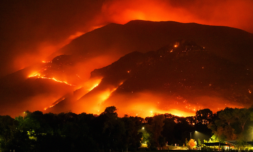The Department for Education in the UK is planning to create a new GCSE qualification focused on ecological teachings and how students can help protect the planet. This will reportedly come into effect in 2025.
If only we knew then what we know now, right?
Perhaps if we’d known the full extent of the threats carried by climate change, we’d have responded with some level of urgency back in the 1950s – is the misguided sentiment that drives us younger folk to the brink of insanity.
Yet, grossly unfair as it may be, those who will likely suffer the worst effects of climate change and be burdened with the most responsibility of fixing the crisis are the younger generations.
Therefore, it’s important that as many young people as possible become clued up on the natural world, climate change, and general sustainability.
This, thankfully, is a view shared by the UK Department for Education, which is bringing an entirely new ‘climate change’ GCSE curriculum into effect for 2025. Education secretary Nadhim Zahawi is expected to officially announce this plan on Thursday (21 April) in greater detail.
Teenage pupils are already learning about environmental issues through the studies of urbanisation in geography, and land use in biology, but the government has revealed this course will ‘go further’ and delve specifically into the impact of human activity on natural environments.




















